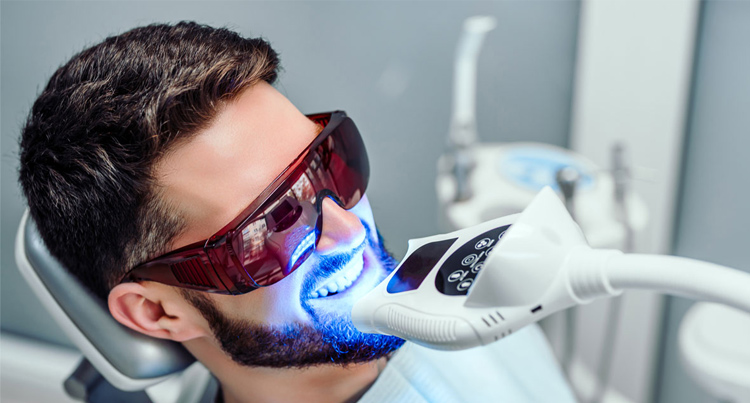Teeth Whitening
Brushing and flossing are everyday ways to keep your teeth bright, white and healthy. Still, you might feel like your smile is lacking some sparkle or is more yellow than it used to be. In a recent survey, when asked what they’d most like to improve about their smile, the most common response was whiter teeth.

Why Did My Teeth Change Colour?
Over time, your teeth can go from white to not-so-bright for a number of reasons:
- Food and Drink: Coffee, tea and red wine are some major staining culprits. What do they have in common? Intense colour pigments called chromogens that attach to the white, outer part of your tooth (enamel).
- Tobacco Use: Two chemicals found in tobacco create stubborn stains: Tar and nicotine. Tar is naturally dark. Nicotine is colourless until it’s mixed with oxygen. Then, it turns into a yellowish, surface-staining substance.
- Age: Below the hard, white outer shell of your teeth (enamel) is a softer area called dentin. Over time, the outer enamel layer gets thinner with brushing and more of the yellowish dentin shows through.
- Trauma: If you’ve been hit in the mouth, your tooth may change colour because it reacts to an injury by laying down more dentin, which is a darker layer under the enamel.
- Medications: Tooth darkening can be a side effect of certain antihistamines, antipsychotics and high blood pressure medications. Young children who are exposed to antibiotics like tetracycline and doxycycline when their teeth are forming (either in the womb or as a baby) may have discoloration of their adult teeth later in life. Chemotherapy and head and neck radiation can also darken teeth.
How Does Teeth Whitening Work?
Teeth whitening is a simple process. Whitening products contain one of two tooth bleaches (hydrogen peroxide or carbamide peroxide). These bleaches break stains into smaller pieces, which makes the colour less concentrated and your teeth brighter.
Does Whitening Work on All Teeth?
No, which is why it’s important to talk to your dentist before deciding to whiten your teeth, as whiteners may not correct all types of discoloration. For example, yellow teeth will probably bleach well, brown teeth may not respond as well and teeth with grey tones may not bleach at all. Whitening will not work on caps, veneers, crowns or fillings. It also won’t be effective if your tooth discoloration is caused by medications or a tooth injury.
What Are My Whitening Options?
Talk to your dentist before starting. If you are a suitable candidate, there are two ways to put the shine back in your smile:
- In-Chair Bleaching
A whitening treatment at a dental surgery can usually be completed in one visit. The dentist will give your teeth a quick check-up to ensure they are in good condition prior to the procedure. A gel is used to protect the gums and a solution containing hydrogen peroxide is applied to the teeth. The teeth are then exposed to a special bright light that causes oxygen to be released. Stains are lifted off the surface of the teeth and the dentine is whitened. - At-Home Bleaching from Your Dentist
Your dentist can provide you with a custom-made tray for at-home whitening. In this case, the dentist will give you instructions on how to place the bleaching solution in the tray and for what length of time. This may be a preferred option if you feel more comfortable whitening in your own home at a slower pace, but still with the guidance of a dentist. Out-of-office bleaching can take anywhere from a few days to a few weeks.
What About Over-the-Counter Bleaching Products?
Over-the-counter products are a bit of a hit and miss affair. Some of the products are quite good; some are not so good. Avoid any over-the-counter product that claims immediate results. Many times, these products can contain higher concentrations of whitening solution than what is recommended for the individual. Other alternatives do not contain an effective concentration of whitening agent. Unfortunately, teeth whitening products are not regulated in any way and, if your teeth are crooked or rotated, you may not get the results you want.
Are There Any Side Effects from Teeth Whitening?
Some people who use teeth whiteners may experience tooth sensitivity. That happens when the peroxide in the whitener gets through the enamel to the soft layer of dentin and irritates the nerve of your tooth. In most cases the sensitivity is temporary. You can delay treatment, then try again. Overuse of whiteners can also damage the tooth enamel or gums, so be sure to follow directions and talk to your dentist.
How long will the whitening last?
In most cases whitening will last from 6 months to 2 years but it is dependent on which product and technique you use. Good oral hygiene and regular dental cleans will help keep your teeth white for as long as possible. However, diet, ageing, alcohol, smoking, medication, and many other factors can change the shade of your teeth over time. The good news is that when the inevitable happens, you simply need to see your dentist for a touch-up to maintain your smile.

